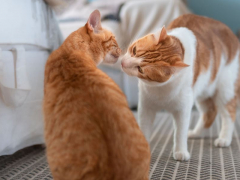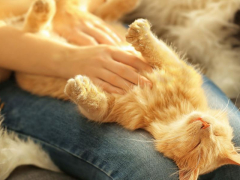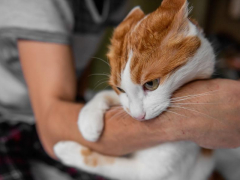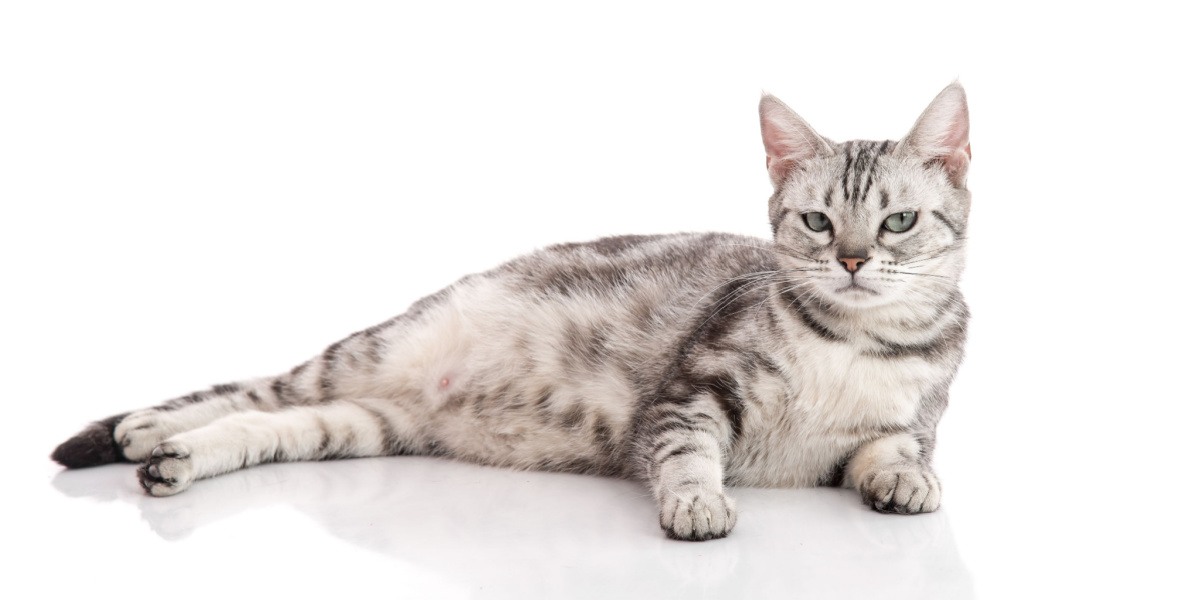
Pregnancy is an exciting time and it affects everyone in the household, even your cat. With pregnancy, comes the hustle and bustle of preparing for a new baby. This can involve new furniture, changes in house layout, change of routine, and more. Considering that cats love routine, it’s likely that they’ll pick up on these changes.
But what about the pregnancy itself? Do cats have a sixth sense that you’re pregnant? Do they know that there’s a new family member on the way? Read on to find out.
Changes in Pregnant Women
Pregnant women often experience a lot of hormonal changes (due to the pregnancy hormones estrogen, progesterone, prolactin, relaxin, hCG – human chorionic gonadotropin) to sustain the pregnancy. These hormones can sometimes subtly change body odor or even release pheromones.
These smells won’t be detectable by us as humans, but it’s very likely that your cat could pick up on these smells. If they do, they might be showing more interest in you. Cats have an amazing sense of smell.
To put this into perspective, humans have 5 million olfactory receptors that pick up scent. Cats on the other hand, have 45-80 million up to 200 million olfactory receptors. Their sense of smell is at least 14 times greater than ours. So it’s very likely that cats can smell very slight changes in body odor.
Cats also have the vomeronasal organ (also called the Jacobson’s organ). This is an organ located on the roof of a cat’s mouth and it enables them to detect pheromones. Pheromones are like chemical smells that cats use to communicate with each other. Pregnant women can emit pheromones so it’s possible that cats can detect this.
Pregnant women often have a higher body temperature than normal. Cats are heat seekers and sun worshippers so it’s very likely that they’ll notice this heat increase and seek out your lap for a cuddle!
Can Cats Hear the Baby’s Heartbeat?
You probably already know that cats can hear incredibly well. Their sense of hearing is far better than ours and even dogs. We can often see them moving their ears like antennae and tuning in on noises far away. You may have wondered then, can cats hear the baby’s heartbeat in the womb?
While there’s no scientific evidence or studies done on this, we do know that cats have a remarkable sense of hearing. They can distinguish between two different mice standing 3 inches from each other that are 3 feet away from them. We also know that they can hear 4-5 times farther than humans can.
It seems very likely then, that cats can hear the baby’s heartbeat as their hearing is much better than ours. It’s unknown when they might start to hear the heartbeat however, it’s less likely to be in the early pregnancy stage.
The heartbeat would become more pronounced later into the pregnancy so there’s a higher chance your cat can hear it in the later stages while cuddled up on your lap.
Emotional Changes That Cats Can Sense
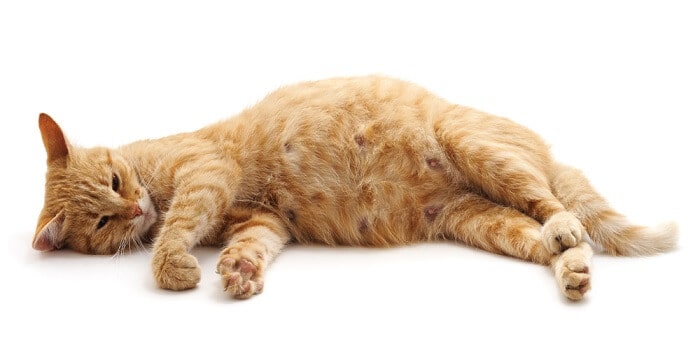
Cats are very observant pets and can be sensitive to our mood changes.
Apart from the physical changes (such as increased hormones and body temperature) that cats might sense, there are other changes too. Pregnancy can cause a vast array of emotions for both parents.
A new arrival on the way can cause parents to feel a variety of emotions; excited, nervous, overjoyed, worried amongst a few. Pregnancy itself can cause mood changes due to varying hormonal levels for a pregnant owner.
Cats are very observant pets and can be sensitive to our mood changes. They can often sense when we feel sad, angry or excited. How they react to the emotional changes depend on the individual cat. Some cats might ignore these changes while others can be affected by them.
For example, if we are in a very happy positive mood our cat might be more inclined to seek interaction from us. On the other hand, if we’re feeling very upset or angry, they might avoid us. It can be the opposite for other cats. It depends on their personality and how they themselves are feeling at that point in time.
Household Changes That Might Affect Your Cat
Cats can sense subtle changes in mood, body temperature, pheromones and maybe even hormonal changes. These are changes that can be discreet and difficult to detect. Some changes are more obvious like household changes.
Household changes are inevitable when a new baby is on the way. There will be new furniture e.g. cot, moses basket, changing table, car seats and many more along with baby supplies such as clothing, nappies, wipes, musical toys etc. All of these things will feel very new and could even be scary to your cat.
How To Reduce Stress for Your Cat
There are many changes when a new arrival is on the way. Between new furniture, equipment, changes in routines and house layout it can be overwhelming for us. If it’s overwhelming for us, what about our cats? It may not seem like a big change to us, but as cat owners we need to imagine it from our cat’s perspective.
Consider the following anecdote. Imagine you sleep on the windowsill in the spare room every morning, and then go downstairs for some food, back upstairs for another nap and then downstairs again for some playtime. All of a sudden, there’s a cot in the spare room and the door is often closed, you aren’t allowed to go in there anymore.
Your bed is suddenly downstairs where there’s a baby crying and lullaby music playing, your food is in the same room that the baby is crying in so you avoid going in there.
Sounds stressful? Yes, I’m sure you agree that it does. That is one very common scenario that cats find super stressful and it could even cause behavioral problems.
Stress can be prevented in this situation by doing a few things;
- Introduce baby items such as new furniture and equipment slowly, bit by bit BEFORE the baby arrives.
- If you intend on keeping your cat out of certain rooms, start doing this before the baby arrives and give them a good alternative space in a quiet part of the house.
- Start getting them used to the noises that they’ll hear e.g. musical toys, lullabies, baby cries.
- Provide plenty of resources such as litter boxes, food and water stations, beds and scratching posts in multiple quiet areas of the house.
- Provide plenty of ‘escape’ options. These are options that your cat has if they feel overwhelmed e.g. hiding boxes, beds up high on shelves, outdoor options if they go outdoors.
- Plug in synthetic pheromones which will help to reduce stress for your cat.
Basically, think about how these changes might affect your cat. Try to minimize any major changes by spreading them out and introducing them slowly. Always provide your cat with alternatives and make sure that they don’t have to go into noisy parts of the house to get to their food, water, and litter boxes.
Spending time with them is also very important so provide plenty of interaction on their terms. This will help your cat adjust to the new baby smoothly and prevent behavioral changes.
How To Introduce Cats and Babies
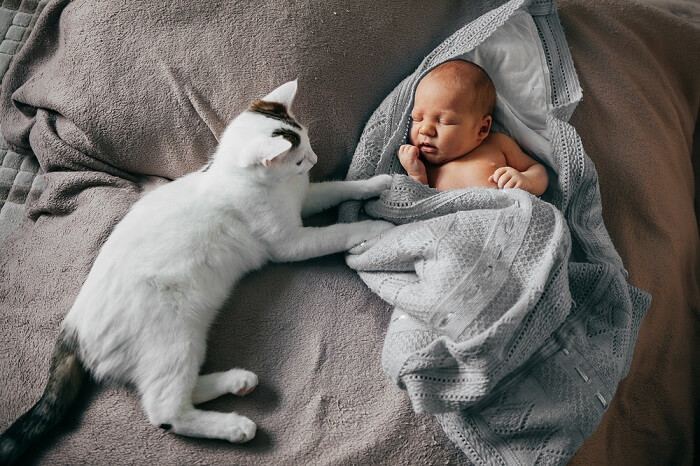
Cats are extremely sensitive to noise and movement so over-excited children very often scare them.
Cats and children can have wonderful friendships that are very rewarding. This will come from mutual respect and gentle interaction. It’s important that all interactions are supervised at all times to prevent any injuries and negative interactions.
When introducing your new baby to your cat, there are a few tips to help the introduction go smoothly;
- Allow your cat to smell and investigate a piece of your baby’s clothing before they meet. This can help build positive associations.
- Keep things calm and quiet when you come home and intend to introduce them.
- Allow your cat to investigate the baby while you’re holding it and supervising.
- Praise positive interaction.
- Don’t punish any negative behavior as your cat doesn’t understand this and it could cause fear and anxiety.
- Initially, keep introductions and interactions short to allow your cat time to adjust.
- Never leave them alone together.
Conclusion
Can cats sense pregnancy? Even though there’s no scientific evidence to prove this, we think that they do! It’s likely that they can sense subtle changes in hormones, body temperature and maybe even hear a heartbeat later in pregnancy. They will also sense changes in the house coming up to the arrival of a new baby and know that something is happening. So if your cat is paying more attention to you than usual, there might be a reason!
Also Read: The Complete Guide to Bottle Feeding Kittens
